|
|
|
Sort Order |
|
|
|
Items / Page
|
|
|
|
|
|
|
| Srl | Item |
| 1 |
ID:
175154
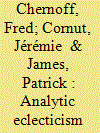

|
|
|
|
|
| Summary/Abstract |
Some scholars in International Relations and comparative politics continue to debate how to obtain the strongest explanatory theory whereas others hold that each approach should be treated as its own area of research. Both of these groups tend to agree that factors from across paradigms cannot be coherently combined with each other. On the contrary, Sil and Katzenstein have argued for analytic eclecticism in scholarship, which would not treat research traditions or paradigms as strict limitations on theory construction. Inspired by pragmatism, they have made a compelling case that considerations of usefulness and knowledge cumulation are more important than paradigmatic fidelity. This forum examines analytic eclecticism from the points of view of neo-empiricism, feminism, and interpretive constructivism, followed by a reply by Sil. A decade has passed since the publication of Sil and Katzenstein’s Beyond Paradigms, so it seems appropriate to reflect upon the strengths and weaknesses of analytic eclecticism.
|
|
|
|
|
|
|
|
|
|
|
|
|
|
|
|
| 2 |
ID:
097625
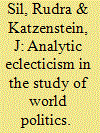

|
|
|
|
|
| Publication |
2010.
|
| Summary/Abstract |
This article defines, operationalizes, and illustrates the value of analytic eclecticism in the social sciences, with a focus on the fields of comparative politics and international relations. Analytic eclecticism is not an alternative model of research or a means to displace or subsume existing modes of scholarship. It is an intellectual stance that supports efforts to complement, engage, and selectively utilize theoretical constructs embedded in contending research traditions to build complex arguments that bear on substantive problems of interest to both scholars and practitioners. Eclectic scholarship is marked by three general features. First, it is consistent with an ethos of pragmatism in seeking engagement with the world of policy and practice, downplaying unresolvable metaphysical divides and presumptions of incommensurability and encouraging a conception of inquiry marked by practical engagement, inclusive dialogue, and a spirit of fallibilism. Second, it formulates problems that are wider in scope than the more narrowly delimited problems posed by adherents of research traditions; as such, eclectic inquiry takes on problems that more closely approximate the messiness and complexity of concrete dilemmas facing "real world" actors. Third, in exploring these problems, eclectic approaches offer complex causal stories that extricate, translate, and selectively recombine analytic components-most notably, causal mechanisms-from explanatory theories, models, and narratives embedded in competing research traditions. The article includes a brief sampling of studies that illustrate the combinatorial potential of analytic eclecticism as an intellectual exercise as well as its value in enhancing the possibilities of fruitful dialogue and pragmatic engagement within and beyond the academe.
|
|
|
|
|
|
|
|
|
|
|
|
|
|
|
|
| 3 |
ID:
175158
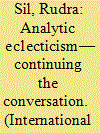

|
|
|
|
|
| Summary/Abstract |
In this response to the contributions in this symposium, I approach the above articles not as wholesale critiques requiring point-by-point rebuttal but as constructive engagements that require clarification or invite further reflection as part of an ongoing conversation. In some instances, I revisit and elaborate upon the main motivations and assumptions that Peter Katzenstein and I had in mind as we sought to lay out the significance of analytic eclecticism for different audiences. At other times, I take it upon myself to consider aspects of our approach that might be updated or reframed in light of concerns raised by some of the authors. I specifically address four issues that have been raised: the core logic of analytic eclecticism and its operationalization with respect to once-dominant paradigms in International Relations; the link between complexity, causality, and constitutive logics; the status of metatheory and the links between eclecticism and pragmatism; and the relationship between scholarly debates and “real-world” issues of policy and ethics. Whether the response is satisfactory or not, it is worth bearing in mind that, for Peter Katzenstein and myself, analytic eclecticism was always meant to be more of an ethos than a method or manifesto; that ethos long predates our published work and is evident in the thoughtful contributions that constitute this symposium.
|
|
|
|
|
|
|
|
|
|
|
|
|
|
|
|
| 4 |
ID:
175156
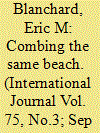

|
|
|
|
|
| Summary/Abstract |
Sil and Katzenstein present analytic eclecticism as a pragmatic, problem-driven, policy-oriented heuristic, posed against the paradigmatism and parsimony inhibiting the study of world politics. I argue that Sil and Katzenstein’s approach is both promising (in that it is one of the more flexible available frameworks to bring separate research traditions into fruitful dialogue) and potentially problematic (if it limits itself to the triad of realism, liberalism, and constructivism). Informed by a recent methodological turn in post-positivist International Relations (IR) and Political Science, this essay takes seriously eclecticism’s commitment to theoretical multilingualism by imagining an eclectic engagement beyond the heuristic’s original purview and calling for eclectic attention to reflexivity, constitutive theorizing, and the dynamics of power and ethics. The article reflects on existing disciplinary power dynamics and disparities and the urgent demand for scholars to more fully contribute to developing effective approaches to real-world threats, such as climate change.
|
|
|
|
|
|
|
|
|
|
|
|
|
|
|
|
| 5 |
ID:
175157
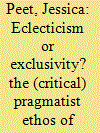

|
|
|
|
|
| Summary/Abstract |
Eclecticism in International Relations (IR) claims to reject the rigid boundaries set by various theoretical traditions, yet, in practice, it falls short of moving the field “beyond paradigms” and tends to produce analytical exclusivity rather than eclecticism. This exclusivity is the result of Sil and Katzenstein’s investment in tenets of American pragmatism. These tenets favor consensus and universalism, leading to the reproduction and exclusivity of the theoretical status quo. Dissolving paradigmatic boundaries requires a more critical form of pragmatism. Drawing on the common origins of feminism and pragmatism paired with the contemporary feminist concept of intersectionality, this essay proposes a critical pragmatist ethos and an intersectional analytic eclecticism. This can produce a more inclusive form of analytic eclecticism and render visible the power dynamics that shape experiences as well as academic scholarship. Only when analytic eclecticism is informed by intersectionality and a critical pragmatism might it actually move IR “beyond paradigms.”
|
|
|
|
|
|
|
|
|
|
|
|
|
|
|
|
| 6 |
ID:
175155
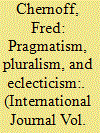

|
|
|
|
|
| Summary/Abstract |
This paper seeks to show ways in which analytic eclecticism can be strengthened to encourage hybrid theorizing capable of yielding more practically useful principles for foreign policy decision-makers. The paper also seeks to show that some of the advantages of analytic eclecticism are overstated, notably the ability to sidestep difficult questions in the philosophy of social science. Nevertheless, with a proper deepening of their discussion of pragmatism, the core of the practical consequences of analytic eclecticism can be advanced with greater force and with a strengthened methodological rationale.
|
|
|
|
|
|
|
|
|
|
|
|
|
|
|
|
|
|
|
|
|